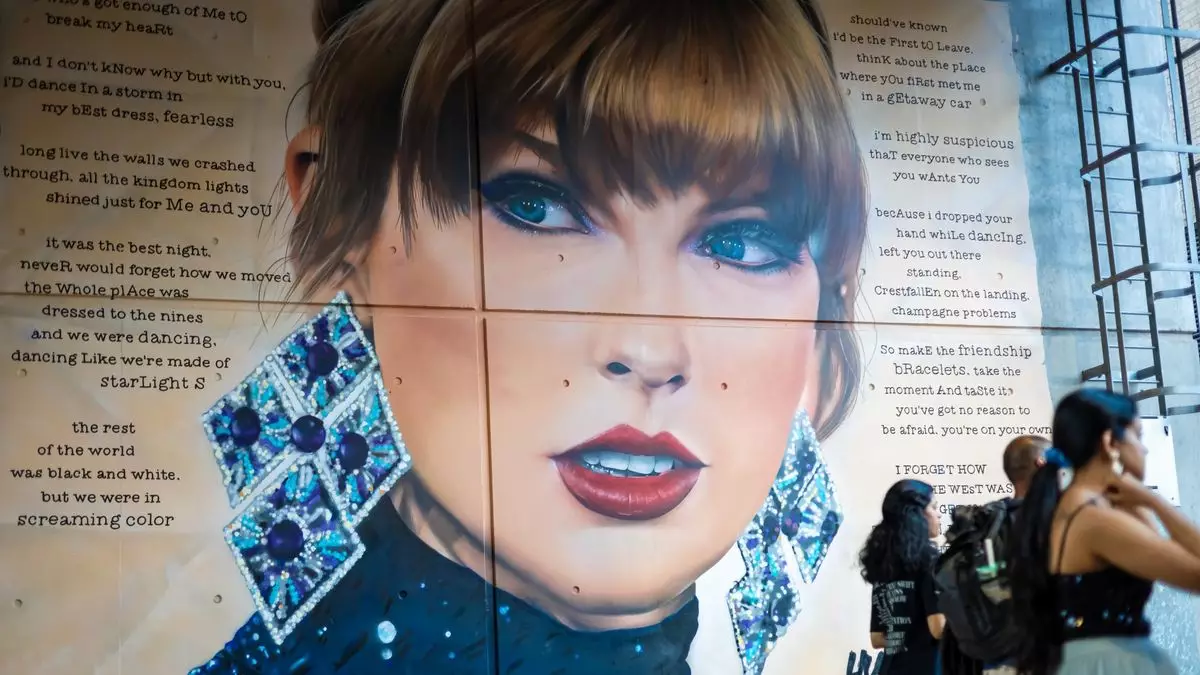In an era dominated by celebrated mega-events like the Super Bowl and the Olympic Games, Taylor Swift’s Eras Tour has emerged as a significant economic force impacting the hospitality industry. Reports indicate that this monumental tour has generated an astonishing $1 billion in hotel revenue across various continents, including North America, Europe, and Asia. This figure is not just eye-catching but also suggests a seismic shift in how we perceive entertainment and tourism interactions. As Zach Demuth, global head of research for JLL’s hotels group, aptly remarks, the Eras Tour has created “many mini-Super Bowls,” showcasing Swift’s unique power to draw crowds and activate economies.
What sets the Eras Tour apart from more traditional events like the Super Bowl is its extended duration and geographical reach. Swift’s concerts not only attract devoted fanbases but also encourage them to travel long distances, thus transforming regional economies. Particularly in major urban centers with abundant hotel inventory, such as Las Vegas and Paris, the tour has redefined peak hotel occupancy and room rates, determining new standards for what constitutes a successful event in the hospitality sector.
To fully comprehend the economic ramifications of the Eras Tour, examining hotel occupancy rates and revenue during specific periods is essential. For instance, during Swift’s March concerts in Las Vegas, hotels reported occupancy levels soaring at around 90%, along with average room rates between $400 to $500 per night. In stark contrast, the city’s Super Bowl event only achieved approximately 80% occupancy at higher average rates. This data highlights the Eras Tour not merely as a series of concerts but as vibrant economic occurrences reshaping the landscape of hospitality.
In Miami, where the tour resumed on October 18, the local JW Marriott Turnberry Resort & Spa illustrated this effect concretely. The hotel reported a revenue increase of nearly $1 million in comparison to the same weekend last year, spurred by the influx of concertgoers. The occupancy rate surged by 30%, reflecting the thorough planning and targeted promotional strategies that hotels have adopted in anticipation of this concert series. The JW Marriott cleverly crafted a full Eras Tour experience, going beyond just room bookings to create a holistic environment in which fans could celebrate and engage with the brand of Taylor Swift.
The ripple effects of the Eras Tour extend into various ancillary industries, as hotels, restaurants, and transport companies capitalize on the unique opportunity presented by Swift’s dedicated fanbase. For example, Florida’s Brightline train service launched a “Swift Sing-Along Train,” complete with interactive activities tailored to the concert experience. This innovative strategy not only drew attention but also enhanced customer engagement, reinforcing the economic benefits of hosting such large-scale events.
Various travel companies have also seized this momentum. New York-based On Location Tours and GetYourGuide collaborated to offer exclusive walking tours that journey through significant places in Swift’s life, illuminating her connection to the city while facilitating an immersive experience for fans. Such initiatives showcase the burgeoning trend of experiential tourism, where the focus shifts from merely attending events to fully engaging in the environment surrounding them.
Perhaps one of the most surprising outcomes of the tour is its influence on international travel patterns. JLL’s research suggests that a notable portion of concert attendees in Europe hailed from the United States, with many finding it financially advantageous to travel abroad to attend shows. This trend underscores the increasing globalization of the entertainment industry, whereby fans are willing to explore international destinations rather than settle for local events.
Hyatt Hotels’ CEO, Mark Hoplamazian, has even gone so far as to claim that the “Taylor Swift effect” has contributed positively to their fiscal performance in Europe, equating her influence to that of the Olympics. This sentiment highlights not just the potential for economic growth but also the intricate interplay between cultural phenomena and global markets.
The Eras Tour has undoubtedly acted as a transformative catalyst within the hospitality industry and global tourism at large. As travel advisor Tim Davis notes, clients are increasingly willing to invest substantial sums for a chance to experience Swift’s concerts. This trend signals a broader shift in consumer priorities, wherein unique experiences take precedence over conventional travel plans.
Taylor Swift’s economic impact reaches far beyond simple concert ticket sales; it signifies a monumental moment where music, travel, and hospitality entwine to create burgeoning economic opportunities. As we navigate this new landscape, hospitality providers need to understand and adapt to these shifts, positioning themselves uniquely to harness the vibrant energy surrounding such monumental events. In doing so, they can create not just a service destination but a memorable experience, ensuring they remain relevant in this ever-evolving industry.


Leave a Reply